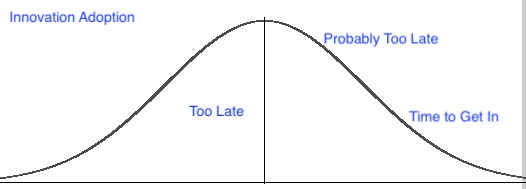Just about every tech and business conference today have a focus on artificial intelligence. Every industry is scrambling to figure out how to use it and what impact it will have. Fear of competitors capitalizing on the technology and putting distance between non-adopters is a common topic. In addition, marketing departments have inserted the term all over websites claiming to have some.
Working in the legal industry, I’m seeing firsthand the confusion and almost sense of doom that the perception of AI has brought about. There is a feeling that the industry will be disrupted - but where on the scale of efficiency it will take things is a complete unknown. The buzz and possibilities have led to people “just wanting to do something with it”.
Technology’s march over the last 30 years has taught many lessons - one of which is that early adopters often get it wrong. Innovation costs a lot of time, money, effort and emotion. It takes resources away from servicing existing clients and business fundamentals. For most established businesses, it has been far more prudent to allow technologies to develop and get involved in somewhat proven industry solutions down the road. Just not too far down the road - when it is too late.
When to jump in?

This is the trick. If you go too early you will likely get it wrong. If you go too late you might be out of business. Early Internet businesses are a good case study. Amazon built an online marketplace for books when the web was fairly new. What they did was extremely hard, cost a lot of investment capital and for the longest time wasn’t profitable. They won big, however, because their competitors waited too long to react. For the longest time if you wanted to shop online you had only Amazon. The others kept exclusively running their stores - or made a half-hearted attempt at online sales. They had the main ingredients to survive the transition to online retail - operational and logistical science expertise. They just didn’t get the tech until it was too late.
On the other end of the spectrum, you had Pets.com. Everyone’s favorite dot.com disaster. They got the tech and the marketing for sure (see sock puppet). What they lacked was the ability to run a fulfillment business at scale. They infamously went from IPO to bankrupt in a handful of months.
True innovation has typically come from new companies (the Silicon Valley model) or very large companies (think Bell Labs, Xerox). The former have few customers to worry about and the latter have endless resources.
For everyone else - applying the lessons of the past - the best I can figure is to aggressively stay aware of what is happening with new technologies - in this case, AI. Stay plugged into the emerging tech scene and the related successes and failures of your industry. When it gets to the point where there are several successes - it’s time to get in. It feels like the aim should be to be part of the first 15 - 20% of the adoption Bell Curve. By 15% most of the really hard stuff has been worked out. Much after 20% you risk falling too far behind.

Currently, no one really knows what impact AI will have on jobs, revenue, and competition. We do know it will add complexity to almost every facet of business - perhaps similar to the way algorithms have changed Wall Street. When and how to harness this technology may very well decide which businesses survive and which don’t.
Perhaps someone will develop a machine learning system that will tell people what to do in regards to AI.

